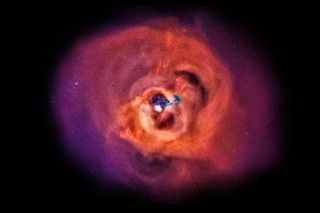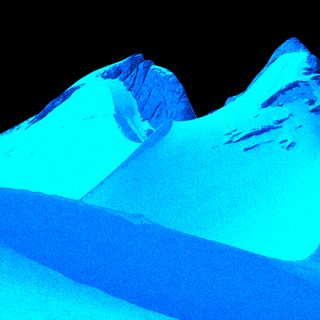
Nasa Recorded ‘Cosmic Horror’‑like Sound From a Black Hole
From a “cosmic horror” to the “terrifying ghosts of Bjork,” the black hole’s sound is testing the limits of human language.

Do black holes make any sound? They possibly couldn’t — physics 101 tells us sound waves need a physical medium to travel: air, wood, water. Most of space is a vacuum, so sound can’t exist in space, at least not in the same way we experience them on Earth. But the question of what a black hole sounds like, or what sonic adventures are possible in space, is one filled with potential for unbridled imagination.
An audio clip from NASA lends some shape to that flight of fancy. Researchers released an audio clip of sound waves originating from an enormous black hole some 240.1 million light years away from Earth, at the center of the Perseus galaxy cluster. The sound is heavily edited; the acoustic waves were scaled by 57 and 58 octaves so that human ears could hear it, along with mixing it up with some other data. “Another way to put this,” NASA said, “is that the [sound waves] are being heard 144 quadrillion and 288 quadrillion times higher than their original frequency.”
The audio is a sonic debunking of the notion that sound can never exist in space. “A galaxy cluster has so much gas that we’ve picked up actual sound,” the agency tweeted on Sunday. The beauty lies in the mystery and magnificence of the whole documentation. When we say the space is a territory of silence, it doesn’t mean cosmic objects aren’t making sounds. It’s just that there is no medium for them to vibrate off of. This is what makes Perseus’s black hole intriguing: it overcomes the sound barrier because of the galaxy cluster’s gas composition.
“A galaxy cluster has so much gas that we’ve picked up actual sound,” the agency tweeted on Sunday.
The 34-second audio clip has proven to be deeply unsettling to people: some called it spooky, eerie, like the “terrifying ghosts from Bjork,” like a rumbling stomach. It sounds a bit like the landing of the time travel machine TARDIS in Doctor Who. Still, it was “ethereally beautiful.”
The beauty lies in the mystery and magnificence of the whole documentation. Scientists knew from 2003 that the galaxy in question was filled with sound that we’re not hearing: the Chandra X-Ray Observatory had collected data of pressure waves from a black hole causing “ripples in the cluster’s hot gas that could be translated into a note,” the agency said in a news release from May.
This data had been sitting around since it was gathered nearly 20 years ago. The decision to turn it into sound came only recently, as part of NASA’s effort over the past two years to translate its stunning space photography into something that could be appreciated by the ear. But the silence isn’t because cosmic objects aren’t making sounds. Their waves just don’t have anything to travel through.
Related on The Swaddle:
People Baffled at Google Maps Showing a ‘Black Hole’ in the Middle of the Ocean
“A data sonification of an actual sound wave in this cluster of galaxies where there is this supermassive black hole at the core that’s sort of burping and sending out all of these waves, if you will… we’ve taken that sound that the universe was singing and then just brought it back up into the range of human hearing,” NASA visual scientist Kimberly Arcand told NPR.
That sound waves radiate through space and black holes serve more than our fascination. These waves are critical in the evolution of galaxy clusters over billions of years too: they transport energy through plasma which further helps with star formation.
“If there was a way to translate the emotional experience of looking into the universe into a sonic one, we would probably all hear sounds unique to our own imaginations,” as Astronomy noted.
Our interpretation of sound from, and of, a black hole has never found an articulation capable of describing something we were never meant to hear. Author Philip Pullman came close to waxing poetic about the flickering mysteries of the Northern Lights: “The sight filled the northern sky; the immensity of it was scarcely conceivable. Pale green and rose-pink, and as transparent as the most fragile fabric, and at the bottom edge a profound and fiery crimson like the fires of Hell, they swung and shimmered loosely with more grace than the most skillful dancer.”
Our articulation of what sound a black hole makes will always be imperfect. It puts on display the limitations of language, the endeavor to describe a symphony that is functioning at a scale unfathomable to us, but still within our reach in a way.
As one person noted: “Everyone keeps talking about how scary this sounds but genuinely to me it just sounds like the song it makes. Everything vibrates and has a hum to it, she’s just singing to us.”
The misconception that there is no sound in space originates because most space is a ~vacuum, providing no way for sound waves to travel. A galaxy cluster has so much gas that we've picked up actual sound. Here it's amplified, and mixed with other data, to hear a black hole! pic.twitter.com/RobcZs7F9e
Saumya Kalia is an Associate Editor at The Swaddle. Her journalism and writing explore issues of social justice, digital sub-cultures, media ecosystem, literature, and memory as they cut across socio-cultural periods. You can reach her at @Saumya_Kalia.
Related


New Three‑Parent Fertilization Technique Could Help Trans Men Have Children
